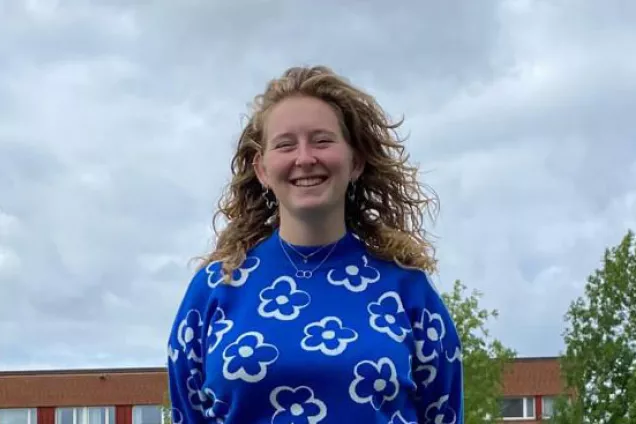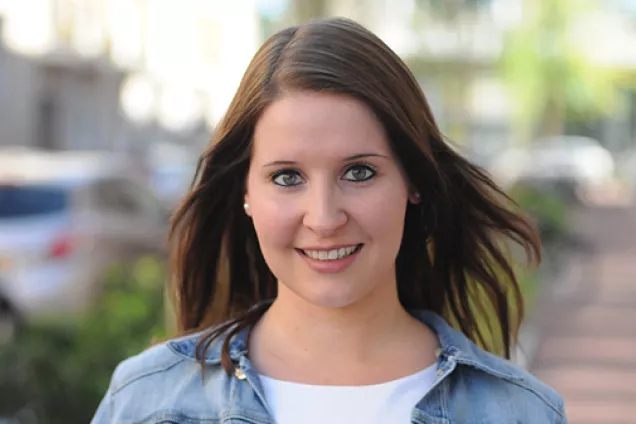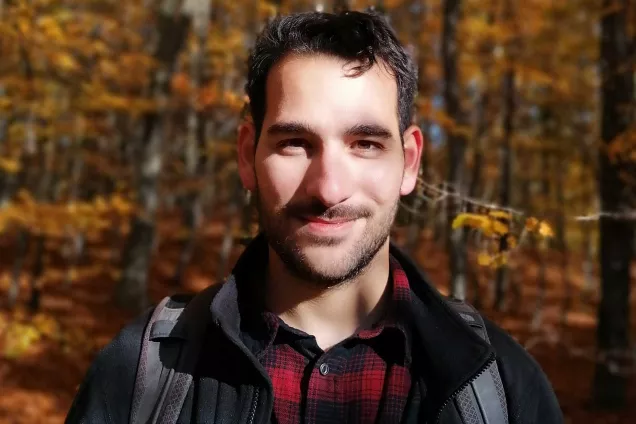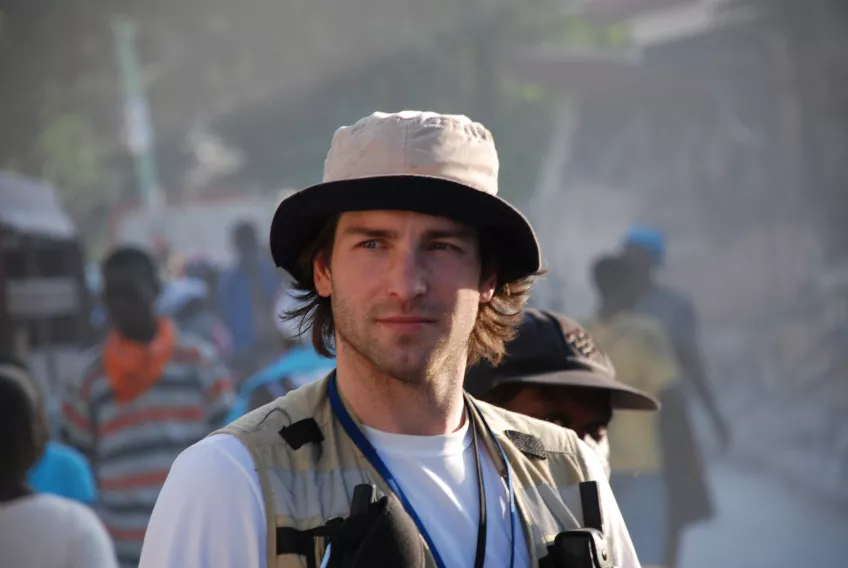Interview with the programme director
Lund University started an internationally oriented Master’s programme in Disaster Risk Management and Climate Change Adaptation in the autumn of 2015. The programme is designed to help meet the rapidly growing need for people educated in this field.
Introducing Magnus Hagelsteen
What is your academic background?
"I hold a BSc in Fire Protection Engineering from Lund University in 1997 and in 2009 I completed a Master’s in Disaster Management from the University of Copenhagen and Lund. I have been at Lund University since 2012 where I combine theory and practice as a lecturer and PhD student, and I expect to complete my PhD next year."
What courses are you teaching and what is your research about?
"I am the course coordinator for two courses in the DRMCCA programme, the Societal resilience course and the Capacity development course. My interest in capacity development started in 2003 when I was working in Afghanistan for United Nations Assistance Mission in Afghanistan (UNAMA). My research interests concern capacity development from different perspectives to make society more resilient."
Do you have experience in the field?
"I have worked for 12 years for a Swedish governmental agency (MSB – The Swedish Civil Contingencies Agency) with an international profile in Disaster Risk Management with disaster response, preparedness and capacity development. I worked both on a strategic and operational level, dealt with external relations with UN, EU, NATO/PfP, NGOs, and the Red Cross and Red Crescent Movement and conducted professional training courses related to disaster risk reduction, disaster response and recovery at global, regional, national and local level with several actors involved.
I have experience from membership in several different international assessments and coordination teams such as European Union Civil Protection Team (EUCPT), United Nations Disaster Assessment and Coordination (UNDAC) team (2005-2016), and I belong to the MSB field staff roster. I am also a trained Red Cross delegate and Field Assessment Coordination Team (FACT) member. I have been involved in several international missions and projects and my ambition is to retain one foot in the field."
About the programme and research at the department
How would you describe the programme to a potential student?
"Students come from all over the world and from various academic disciplines, such as engineering, social, political, natural and environmental sciences. The DRMCCA is a unique two-year multi-disciplinary Master’s programme that offers a mix of practical and theoretical learning, i.e., connections between theory and practice. The emphasis is mainly on proactive approaches, disaster risk management and climate change adaptation, and developing an ability to apply skills and generic tools in various working contexts. With a holistic view, the programme addresses topics such as resilience, risk assessment, risk communication, capacity development and assessment, project design, climate change risks, risk-based land-use planning, preparedness and contingency planning, and disaster response management. There is a possibility to do an internship and/or take some extra courses to specialise in a certain area. The courses are interlinked and build on each other, with a pedagogical progression throughout the programme.
The relationship between teachers and students is relaxed and non-hierarchical and the programme has a creative and engaging culture. The programme has a strong focus on group work and interaction between students and teaching staff creating a mutual learning environment. Students come from all over the world with a mix of different academic backgrounds and contexts, as well as many with prior work experience, which enriches the interactions and discussions between students and staff. There is always an open door for students to come and see us if they have any questions."
Is there any cutting-edge research going on in the department that the students benefit from? If yes, how?
"The Division of Risk Management and Societal Safety is responsible for the vast majority of the courses on the programme. The division is renowned for its research that links descriptive studies of issues of risk, safety and sustainability, as well as of the systems for governing them, with normative studies designing solutions for the issues and improving the systems. It focuses on how people, organisations and societies deal with events that might threaten something of value; short-term and long-term. Researchers at the division study both how such events themselves are managed (during an emergency/crisis) and how risk is perceived and managed (before the events), focusing significantly on climate-related risk and how to adapt to a changing climate. The research at the division is also world-leading in capacity development as a key process for strengthening resilience.
Although the contexts of the research are diverse and the research problems vary considerably – spanning from risk communication to critical infrastructure protection – the research at the division generally shares a focus on grasping and addressing the four fundamental challenges of complexity, uncertainty, ambiguity and dynamic change."
Concrete examples of when theory and practice meet during the programme?
"In the DRMCCA programme, we have guest lecturers and experts from national and international organisations that share their knowledge in some of the courses. Several courses work with case studies to link theory to practice and a context. Students also get practical insights through writing risk assessments, risk-based land use plans, designing projects, posters, risk communication and contingency plans and taking part in simulation exercises. Many of the teachers are so-called 'pracademics' who combine teaching, theory, and research with practical work and assignments for national and international organisations. There is a possibility of taking an elective internship-based course to get work experience and create a network. The programme has a broad network and has the support of several national authorities and international organisations. They have explicitly emphasised the importance of the programme and endorsed the internship course. The internship course is popular among students and allows students after one year to benefit from their experiences, knowledge, and skills and test them in practice."
Any other thoughts/facts you have, that could be interesting to people applying for this programme?
"We have created a programme that has synergies between disaster risk management and climate change adaptation because these two areas are strongly interlinked. A growing number of governments and international organisations acknowledge the necessity of increasing their efforts in order to develop safe and sustainable societies. When the climate changes, disasters follow and unfortunately it is a growing trend. So, our programme is heavily focused on proactive approaches in order to make society more resilient.
Our programme is unique in that sense. A lot of other programmes in this field focus on the first response and dealing with the disaster after it happens. We don’t. Of course, it is part of the programme, but the focus is on risk assessment, prevention, mitigation, adaptation and preparedness. That is why professional organisations in this field are all so positive about this Master’s programme, as it will help to meet the need for qualified and professional staff. The programme is forward-looking, tailored to meet the needs and demands of the future.
The teaching staff is genuinely transdisciplinary, including teachers with disciplinary roots in engineering, planning, political science, sociology and psychology. There is a huge interest in learning and pedagogy among the teachers and many of them are part of the Faculty of Technology's Pedagogical Academy and have been awarded the distinction of Excellent Teaching Practitioner (ETP)."
Tips for students and career prospects
What do students need to be successful in this programme?
"A student in this programme needs to be actively involved in group work assignments, communicate with diverse groups and work with groups across cultural and multidisciplinary divides, apply soft skills, problem-solving and negotiation skills, present both orally and in writing and use systems thinking. Analytical skills and time management are also valuable to succeed to be able to critically analyse and distil a large amount of academic and grey literature."
What happens after graduation?
"The students who are graduating from the DRMCCA programme will have access to a broad and very interesting job market, everything from local and national authorities, NGOs, the private sector, academia and think tanks to international actors such as UN and the Red Cross and Red Crescent Movement as well as private consultancies. They will be a bridge between risk/climate experts, project managers and policymakers.
Alumni and students have established a network to support each other during and after the programme, the DRMCCA Association (DRMCCAA). DRMCCAA is an alumni- and student-led organisation, supported by the programme’s staff, dedicated to connecting and engaging current students, alumni and faculty affiliated with the DRMCCA Master’s programme, bringing together diverse experiences and knowledge relevant to disaster risk management and climate change adaptation. The Association also acts as a platform for the DRMCCA community to inform each other on news, ideas, and opportunities in the field around the globe. DRMCCAA also supports the internship process for current students, arranges professional development events such as seminars, reunions and other social activities, and publishes newsletters, among other communication materials to strengthen the relationship between students, alumni and faculty."

Meet our student ambassador Fleur
Read her testimonial and chat with her via Unibuddy.

Testimonials from alumni
Read full interviews with alumni of this programme.

Testimonials from students
Voices from first-and second-year students.
